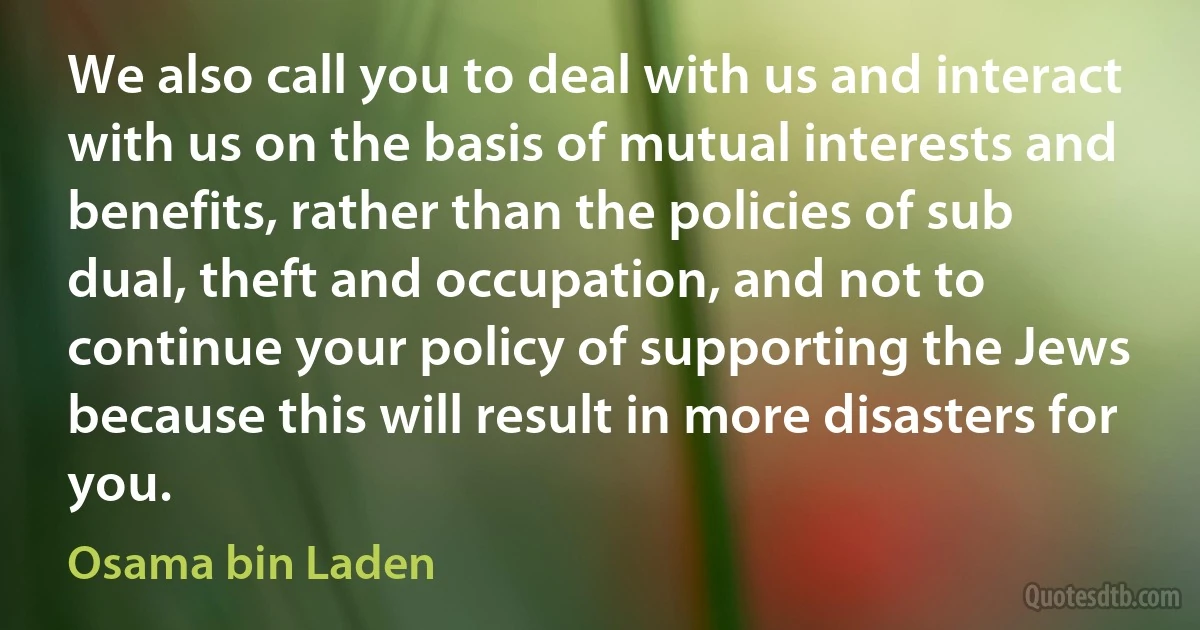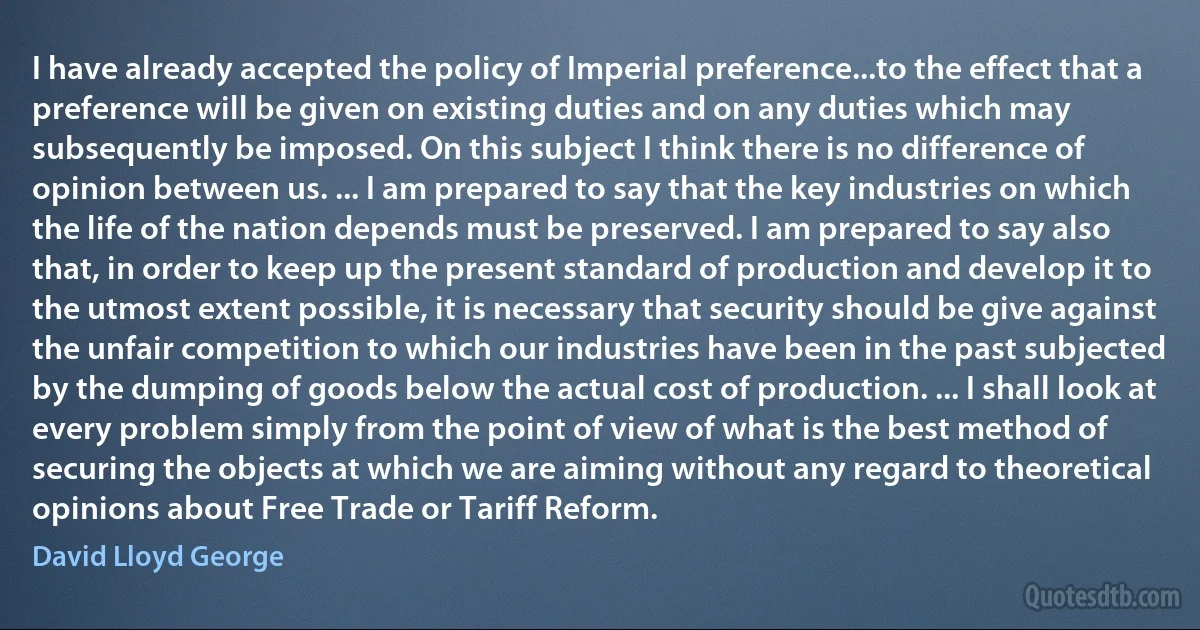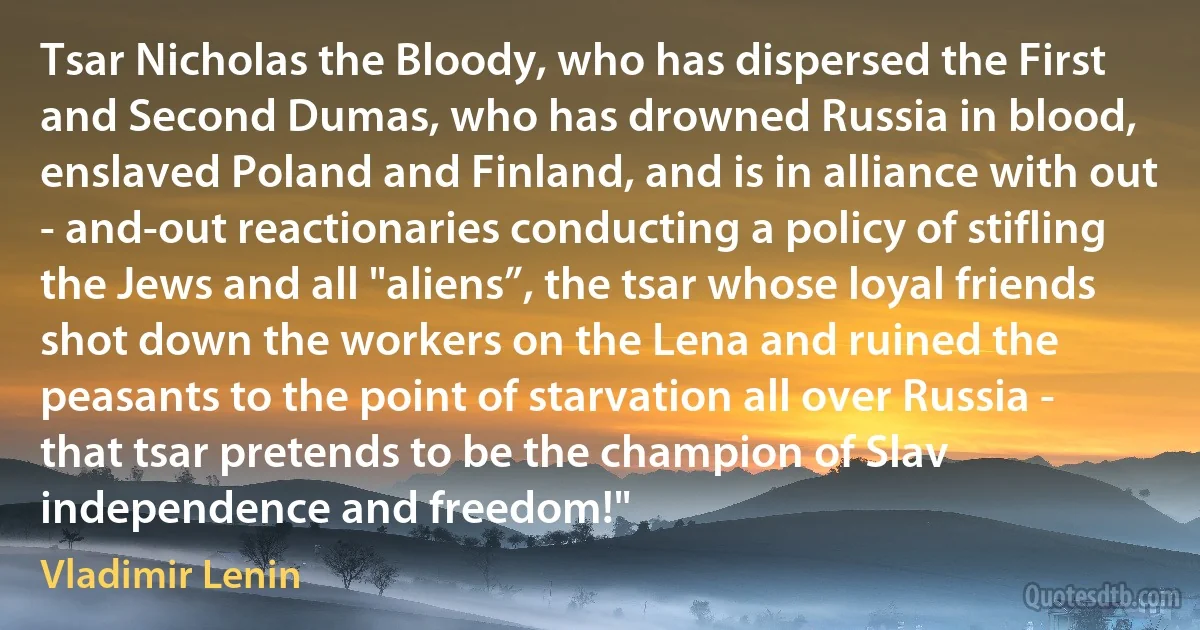Policy Quotes - page 19
This war in Iraq makes millions of dollars for big corporations, either weapons manufacturers or those working in the reconstruction, such as Halliburton and its sister companies... It is crystal clear who benefits from igniting the fire of this war and this bloodshed: They are the merchants of war, the bloodsuckers who run the policy of the world from behind the scenes. President Bush and his ilk, the media giants, and the U. N... all are a fatal danger to the world, and the Zionist lobby is their most dangerous member. God willing, we will persist in fighting them...

Osama bin Laden
I don't like criticizing Milton Friedman not only because he is an old friend but because, outside of monetary theory, we are in complete agreement. Our general views on what is desired and what is not are almost identical until we get on to money. But if I told him what I said before, that I very much doubt whether monetary policy has ever done anything good, he would disagree. He personally is convinced that a good monetary policy is a foundation for everything.

Friedrich Hayek
In the Vietnam War, the leaders of the White House claimed at the time that it was a necessary and crucial war, and during it, Donald Rumsfeld and his aides murdered two million villagers. And when Kennedy took over the presidency and deviated from the general line of policy drawn up for the White House and wanted to stop this unjust war, that angered the owners of the major corporations who were benefiting from its continuation. And so Kennedy was killed, and al-Qaida wasn't present at that time, but rather, those corporations were the primary beneficiary from his killing. And the war continued after that for approximately one decade. But after it became clear to you that it was an unjust and unnecessary war, you made one of your greatest mistakes, in that you neither brought to account nor punished those who waged this war, not even the most violent of its murderers, Rumsfeld.

Osama bin Laden
There is no doubt, and in this I agree with Milton Friedman, that once the Crash had occurred, the Federal Reserve System pursued a silly deflationary policy. I am not only against inflation but I am also against deflation! So, once again, a badly programmed monetary policy prolonged the depression! So, once again, a badly programmed monetary policy prolonged the depression. One consequence of this policy was, of course, the fact that confidence was destroyed.

Friedrich Hayek
What all this amounts to, then, is that the Rule of Law requires that administrative discretion in coercive action (i.e., in interfering with the person and property of the private citizen) must always be subject to review by an independent court which is not an instrument of, or even privy to, the aims of current governmental policy; that its review must in all such instances extend to the substance of the administrative act and not merely to the question whether it was infra or ultra vires; and that, if such a court finds that the rights of private citizens have been infringed, it will assess damages just as if the right of this person had been violated by another private citizen. This, in addition to the familiar requirements of generality, equality, and certainty of the law is really the crux of the matter, the decisive point on which it depends whether the Rule of Law prevails or not.

Friedrich Hayek
Upon their casting vote depends the question whether Britain is to continue its honourable career as a pioneer in the path of human progress which, on the whole, it has pursued so nobly for generations, or whether it is in one leap to spring backward over 80 years and place itself on a level with the protectionist countries of the Continent of Europe, with their low wages, taxed food, fettered industries, and policy of international antagonisms, which interfere with prosperity and imperil the peace of the world. ... Free trade is at issue. ... I appeal fervently to Liberals not to walk straight into this booby trap set for them by the protectionists merely because it is decorated by the Union Jack.

David Lloyd George
Men of science in former ages worked in secret, and instead of publishing their discoveries, taught them in secret to carefully selected pupils. Their motives for adopting that policy are readily intelligible, even if the merits of the policy may seem still open to discussion. At all events, their teaching has not been forgotten; it has been transmitted by secret initiation to men of our own time, and while its methods and its practical achievements remain secrets in their hands, it is open to any patient and earnest student of the question to satisfy himself that these methods are of supreme efficacy, and these achievements far more admirable than any yet standing to the credit of modern science.

Alfred Percy Sinnett
Though patriotism includes a sentimental, as it were a family, feeling for place, we can distinguish the ethical motive from the sentimental. At certain times in certain countries there has been a moral urgency to be patriotic when the actual or ideal policy of a man's nation has been a sine qua non for his conscience. But to-day patriotism, in so far as it means subordination to a specifically national policy, is superannuated. This war, we assume, is not being fought-not by most of us-for any merely national end; we are fighting it, primarily and clearly, for our lives, and secondarily, and, alas! vaguely, for a new international order.

Louis MacNeice
It is said the South will never submit - that we cannot conquer the rebels - that they will suffer themselves to be slaughtered, and their whole country to be laid waste. Sir, war is a grievous thing at best, and civil war more than any other; but if they hold this language, and the means which they have suggested must be resorted to; if their whole country must be laid waste and made a desert, in order to save this Union from destruction, so let it be. I would rather, Sir, reduce them to a condition where their whole country is to be re-peopled by a band of freemen, than to see them perpetrate the destruction of this people through our agency. I do not say it is time to resort to such means, and I do not say that the time will come, but I never fear to express my sentiments. It is not a question with me of policy, but a question of principle.

Thaddeus Stevens
A group of Israeli rabbis has issued a call for the Sharon government to cease its policy of cavalierly allowing the killing innocent civilians in the [Palestinian] Occupied Territories in the course of its military operations against radical groups. They say such actions are inconsistent with the essence of the Jewish religion. Too right! Judaism has given us so much that is noble in ethical religion, and what the Likud is doing is an insult to that long and glorious tradition. Likud's real roots lie not in the Bible but in Zionist Revisionism of the Jabotinsky sort, which is frankly a kind of fascism.

Juan Cole
The overall agenda here is quite simply the ruling classes, or the classes of Europe intend to stride on to the world stage as a powerful economic entity. And they want to be as powerful as the US, meaning they want a stronger foreign policy and a military wing to back them up. But I can assure the Government that the debate will be a very intensive debate, a very vigorous debate and I think the benefit perhaps this time is that certain distractions that were raised the last time would be set aside, and therefore we can concentrate on the more fundamental issues. [...] Take for example this notion that Irish youth would be conscripted into an army. The only people I heard that from was Government ministers in the course of the campaign who said this is being said. Nobody here raised any such red herring. These were the so-called concerns that were being addressed. But the major concerns as to what the Treaty was really about has not been changed one iota.

Joe Higgins
The Poor Peasants' Committees are necessary to fight the kulaks, the rich, the exploiters, who shackle the working peasants. But between the kulaks, who are a small minority, and the poor or semi-proletarians there is the section of the middle peasants. The Soviet government has never declared or conducted any struggle against them. Any steps or measures to the contrary must be condemned most vigorously and stopped. The socialist government must pursue a policy of agreement with the middle peasants.

Vladimir Lenin
I have some hopes for the future. One of the things I hope the new leader will address is an integrated energy policy, because we need to take advantage of the tremendous brainpower that we have amassed over the years relative to conventional and oil-sands oil and gas, and funnel those energies into alternate forms of energy for the future. By that I mean coal, coal gasification, coalbed methane, solar power, wind power, nuclear power, hydro power, all forms of energy other than conventional and oil-sands gas and oil.

Ralph Klein



